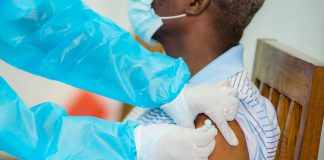
By XINHUA

With Christmas and New Year holidays around the corner, the Rwandan government has imposed restrictions for unvaccinated people in the country, excluding them from indoor restaurants, worship places, public transport and bars starting December 20 to minimize the spread of coronavirus and encourage vaccine skeptics to get their jabs.
The measures were announced by the office of the Prime Minister on Monday and will be reviewed upon health assessment.
The government also prohibited wedding-related receptions while traditional, civil and religious weddings should not exceed 40 persons, according to the statement.
Parties and any other kind of celebrations are prohibited, it added.
It also instructed business owners countrywide to ensure their employees are fully vaccinated.
The Ministry of Health may temporarily close public or private premises with identified clusters of people infected with COVID-19, the statement warned.
The government urged all citizens and Rwanda residents to get fully vaccinated and frequently tested.
It also encouraged people to work remotely while continuing to observe preventive measures. Penalties will be applied for non-compliance, it warned.
More than 7.2 million people in the East African country have received the first COVID-19 vaccination jab while 4.8 million are fully vaccinated, according to the Ministry of Health.
As of Monday, Rwanda had recorded an accumulated tally of 101,582 COVID-19 cases with 1,344 deaths.
Last week, Rwanda had announced stricter COVID-19 preventive measures effective on December 16 following the confirmation of the first six cases of Omicron variant in the country, subsequently suspending nightclubs and increasing quarantine days for arriving travelers.
All arriving passengers must be quarantined for three days at a designated hotel at their own cost. A COVID-19 PCR test will be taken upon arrival and an additional test taken on the third day and on the seventh day at own cost from the arrival date.
The government had reintroduced mandatory 24-hour quarantine for incoming travelers in November following the detection of the Omicron variant in South Africa.